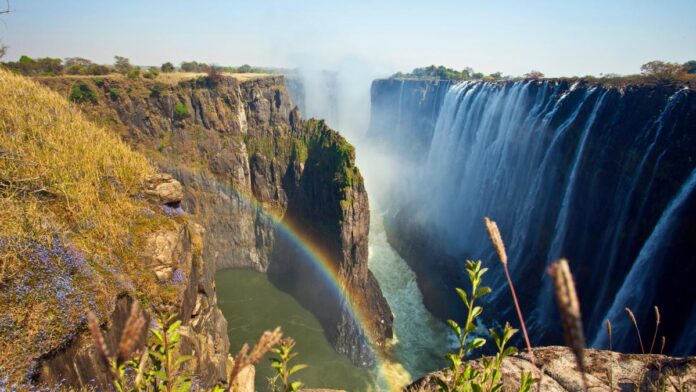As they scrambled into our car, the Australian tourists looked terrified. “Thank you so much,” one stammered. “Oh my God, that was a close shave.” In any other country, walking to lunch on a summer’s day might be considered perfectly sensible. Not in Victoria Falls. The sleepy Zimbabwean town is home not only to 35,000 people, but wandering elephants, lions that don’t seem bothered by traffic lights, buffaloes that plunder vegetable gardens and, occasionally, a leopard with a taste for stray dogs.
While strolling to a pre-wedding lunch, the unsuspecting Australians had wandered straight into elephants which, surprised, had mock-charged. If our car hadn’t been passing at the time, the tourists might have been, as one put it, “goners”. To be fair, neither the Aussies nor the elephants were to blame. Victoria Falls, once a sleepy outpost on the Zambia-Zimbabwe border for adventurers, has become one of the most popular tourist destinations in Africa, putting pressure not only on the environment but its creatures, too. As visitor numbers to the world’s biggest waterfall have increased (from about 47,000 in 2001 on the Zimbabwean side, to almost 400,000 in 2019), animals have been forced to find new routes, increasing human-wildlife conflicts. Last year guards shot at wild animals as they passed along an ancient river path because the land was being built on by a hotel, and two residents were killed by elephants.
As I deliver the Aussies to their lunch at the Lookout Cafe, it’s noticeable just how quickly this little resort town has changed. The once modest cafe – from which you could have a latte while watching bungee-jumping thrillseekers freefall 70m into a gorge – was transformed in 2020 into a 260-seater restaurant, featuring delicacies such as crocodile kebabs and kudu carpaccio. When I drive just down the road to the falls, the car park is so full that there’s a massive traffic jam. And even at the ticket office, it takes 20 minutes – and £40 a head – to get anywhere near one of the Seven Natural Wonders of the World.
When I meet Ross Kennedy, who opened the Victoria Falls Safari Lodge 31 years ago, he says there are now so many tourists at the falls that both his lodge and his polished 20-room Safari Club are at capacity. Business is going so well, in fact, that last year he spent nearly a million pounds on building the town’s first day spa, where guests can enjoy treatments overlooking natural pools and gardens.
But not everyone is happy, as the website keepvictoriafallswild.com notes. Unesco has expressed concern at the denigration of the area, which could affect its world heritage status – for instance, the building of a Six Senses “tree-hotel” on what has historically been protected riverine land just above the falls, and a restaurant above Devil’s Cataract Falls (both of which are featured in the 2023 World Heritage Watch report and are being challenged by conservationists in Zimbabwe’s High Court). Next year a shopping mall will open in the town and, if a billion-dollar plan by a UAE businessman is approved by Zimbabwe’s president, Emmerson Mnangagwa, so will a considerable development that is reported to include a cricket ground, a casino and a sports betting centre.


